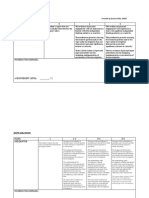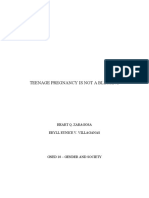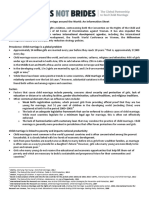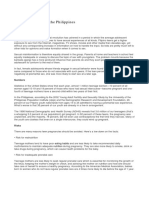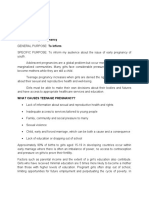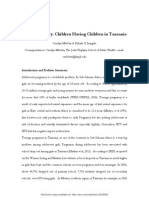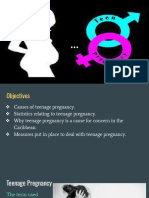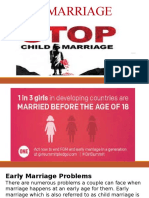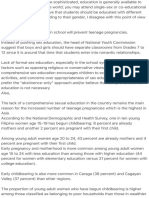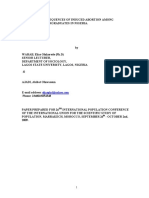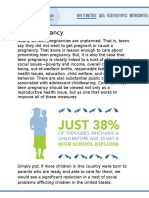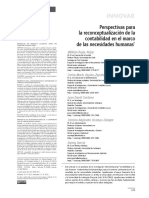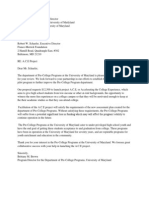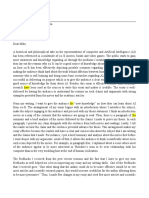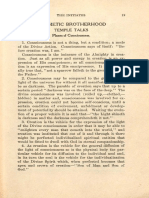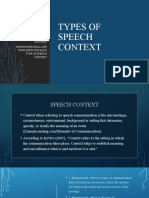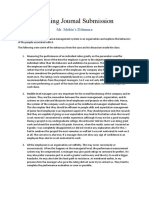Early Marriage in Ethiopia: Causes and Health Consequences: Bogalech Alemu
Early Marriage in Ethiopia: Causes and Health Consequences: Bogalech Alemu
Uploaded by
madilshahzad217Copyright:
Available Formats
Early Marriage in Ethiopia: Causes and Health Consequences: Bogalech Alemu
Early Marriage in Ethiopia: Causes and Health Consequences: Bogalech Alemu
Uploaded by
madilshahzad217Original Description:
Original Title
Copyright
Available Formats
Share this document
Did you find this document useful?
Is this content inappropriate?
Copyright:
Available Formats
Early Marriage in Ethiopia: Causes and Health Consequences: Bogalech Alemu
Early Marriage in Ethiopia: Causes and Health Consequences: Bogalech Alemu
Uploaded by
madilshahzad217Copyright:
Available Formats
| Findings |
Bogalech Alemu
Advocates for gender equality and the abandonment of
harmful traditional practices (HTPs) argue that early marriage
is one of the most harmful practices as it usually denies girls
educational opportunities, leads to poverty and economic
insecurity and has a serious negative impact on their health
and decision-making capacities. It also reinforces other forms
of gender-based violence and problems.1 Early marriage is
mostly common in sub-Saharan Africa and Southeast Asia. It
is rampant in Ethiopia, although prevalence varies from one
region to another. At the national level, 62% of Ethiopian
women aged 20-49 get married before the age of 18.2
Comparative studies conducted in 2004 identified the Amhara
region as having the highest prevalence, with 48% of rural married
women and 28% of urban married women having married before
the age of 15.3 Types of early marriage in Ethiopia include
promissory marriage, whereby a verbal promise is made at infancy
or even childbirth by the parents to have their children get married;
child marriage, in which children under the age of 10 are wedded;
and adolescent marriage, which involves girls aged between 10
and 15. In most cases, the child bride is taken to her in-laws
immediately after the wedding; in other cases the parents agree
that the girl stays with her parents until she is mature enough to
live with her husband. In general, husbands are much older than
their young wives.
Early marriage is a violation of the fundamental rights of the child.
Article 21 of the 1990 African Charter on the Right and Welfare of
the Child states that Child marriage and betrothal of girls and boys
shall be prohibited and effective action including legislation shall be
taken to specify the minimum age of marriage to be 18 years.
Also, the Maputo Protocol on the Rights of Women in Africa
(October 2005) and the newly adopted criminal law of Ethiopia
(2005) acknowledge the minimum age of marriage for women to
be 18 years and state that marriage shall only take place with full
consent of both parties. Unfortunately, knowledge of and respect
for the law is limited among many rural communities.
Understanding the forces at work at the community and family
levels that drive parents to marry their girl-children off is essential
4 Exchange
Photo: World Bank Protection of Basic
Services Project / Michael Tsegaye
Early marriage in
Ethiopia: Causes and
health consequences
An 11-year-old Ethiopian girl who refused an arranged marriage and
chose to stay in school receives an excellence in learning award from
former World Bank President Paul Wolfowitz, July 2006
in the development of effective programmes to tackle this traditional
practice. In 2006, Pathfinder International/Ethiopia conducted a
study on the incidence, reasons for, and the personal and social
consequences of early marriage in both urban and rural areas of
the Amhara region. The study aimed to develop solid evidence upon
which to build future programming. It combined both qualitative and
quantitative research methods. A total of 2,072 women and girls
aged 12-49 participated in the quantitative research. Focus groups
involved parents (married men and women) and unmarried
adolescents (boys and girls separately). Key informants
knowledgeable persons in the study areas including health and
social workers, teachers and religious and other community leaders
were interviewed to find out their perceptions of the status of
early marriage in their communities and of the problems associated
with it. Also, information was collected on existing programme
interventions, policies, laws and plans of action on the issue.
The strongest reason for early marriage is the
desire or need to maintain the familys good
name and social standing
The decision to marry
More than 55% of the ever-married women interviewed reported
having been pressured into marriage. The sources of that pressure
were predominantly fathers (91%) and mothers (88%), followed by
community elders (22%) and others in the community. Parents were
found to have chosen the husband in 85% of the cases, and to have
arranged the marriage in 88% of the cases. More than 60% of the
women reported that they were not informed about the wedding
before the decision was made, and 72% were not asked for their
consent, while 75% did not know the groom before the wedding.
One of our findings was that the mean age of marriage, though still
very low (14), seems to be rising. According to the 2005 Ethiopia
Demographic and Health Survey, 13% of girls between 15 and 19
had been married by the age of 15, against 32% of women in the
25 to 34 age range. This would lend credibility to the argument that
more and more young women, as well as community groups, are
learning about the legal restraints and are turning to the law and
community leaders to resist early marriage.
[ Harmful traditional practices ]
In general, there was a large age difference between couples: nearly
75% of ever-married female respondents were married to older
men, and among these, the age difference was ten years or
more in half of the cases. This age differential affects the level of
communication, mutual understanding and the balance of influence
within the family. It gives the man considerably more power and
control than his young wife. One fifth of the women interviewed
reported that their husbands had been previously married and
29% of these had been married twice or more times.
Causes of early marriage
Despite the legal sanctions against marriage before age 18 and the
growing awareness among leaders and educators that it is harmful
to girls and their families, parents continue to insist upon marrying
their daughters in their mid-teens and go to some lengths to resist
all opposition. Why? More than 80% of respondents could cite no
reason other than it being a tradition they had to adhere to.
According to interviewees, the strongest reason for early marriage
is the desire or need to maintain the familys good name and social
standing. For men in particular, the success of their children is a
measure of manhood and community status, and a daughters
success rests in her making a good marriage and linking her family
to another family. Concern about a girl becoming pregnant out of
marriage is also prevalent, though not nearly as significant as the
issue of status. Only about one-fifth of the respondents reported
this as a reason for early marriage. For some families, the desire to
get macha (money paid to the girls family by the boys family
upon agreement to marriage) is an incentive.
There is little doubt that parents are well aware of the negative
consequences of early marriage, which are commonly discussed
in communities. Though many condemn it in public, they seem
compelled to continue its practice. This pursuit of tradition in the
face of compelling negative evidence is common to most cultures
and must be well understood when developing social change
programmes.
Consequences for health and well-being
Early marriage has severe consequences for the health and wellbeing of girls and women. In the Ethiopian context, some of these
include:
- Marital instability Among the respondents, about 27% of
marriages in urban areas and 19% in rural areas had ended in
Reasons for getting married (in order of importance):
1. It is a tradition in the area
2. To strengthen relationships
divorce or separation. Of those that had married more than once,
56% reported that their first marriage ended either because they
were too young or not interested in the marriage. Many girls run
away from unhappy marriages only to be sent back by their
parents.
- Termination of education In almost every setting, better-educated
women are more likely to use contraception, bear fewer children,
raise healthier children, make better decisions for themselves and
their children and to make greater economic contributions to the
household. More than 80% of girls aged 12 to 14 in our sample
were in school. However, among out-of-school respondents, 28%
cited marriage and 19% cited childrearing obligations as their
reasons for quitting school. Four percent cited their husbands
disapproval of their school attendance as a reason.
Married adolescent girls inability to
negotiate safer sex and other social
pressures represent a critical channel of
vulnerability to HIV infection
- Inability to plan or manage families Statistically, women
who marry early are likely to bear more children. Among our
respondents, those married under 15 averaged 4.96 children;
those married between 15 and 17 had 4.15, and those over the
age of 18 averaged 3.12 children. Young mothers exercise less
influence and control over their children and have less ability to
make decisions about their nutrition, health care and household
management.
- Impact on sexual health of women and girls Young girls can
face considerable physical pain associated with sexual intercourse as a result of the physiological immaturity of their sexual
organs. Complications due to pregnancy at a young age
frequently include obstetric fistula (perforation of the bladder or
bowel, due to prolonged labour).
- Vulnerability to HIV infection A girl is physiologically more
prone to contracting HIV than a male, as her vagina is not well
lined with protective cells and her cervix may be penetrated
easily. Young women are several times more likely than young
men to contract the disease through heterosexual contact. Also,
deeply entrenched socio-economic inequalities further compound
their risk. Marriage can increase married girls exposure to the
virus, especially as older husbands may engage in unprotected
sexual relations with other partners. The risk of HIV infection is
higher among the poorest and most powerless in society, and, as
such, married adolescent girls will be more at risk of infection
than unmarried girls who are not having sexual intercourse.
Married adolescent girls inability to negotiate safer sex and other
social pressures represent a critical channel of vulnerability.
3. For prestige
4. Difficult to get married if older
What needs to be done?
5. The family will be victim of gossip
The results of this study clearly confirm that early marriage practices
in Ethiopia are driven by deeply-held beliefs and traditions that do not
necessarily lend themselves to discouragement through rational
arguments. Further examination and understanding of the forces
6. To earn dowry
7. To protect virginity and avoid premarital affairs
1-2008 5
weighing on parents will prove invaluable to the development of
effective ways to address their concerns. A big challenge is the longterm goal to enhance the status of women in Ethiopia, to strengthen
their personal and reproductive rights, to strengthen their access and
control over resources and thus fight womens poverty and economic
insecurity, to heighten their influence and decision-making power
within the family and the community and to firmly establish their
value as equal partners in development and members of society.
Elimination of early marriage is a clear starting point. The outcomes
from this study suggest the following strategies to address this
problem:
- Challenge the traditions that surround early marriage. Inform
parents, community members, and youth about the negative
consequences of early marriage.
- Create a supportive network of (religious) leaders and teachers
who can empower girls to negotiate with their parents.
- Expand training for health and community workers on the dangers
of early marriage, engaging them as advocates and change
agents in their communities and institutions.
- Strengthen and establish community networks and partnerships
involving girls clubs, teachers, elders, local government officials,
women and youth groups, community and religious leaders, etc.,
that jointly work towards ending early marriage.
- Strengthen the role of the judicial system particularly the police,
judges and persecutors through training on enforcement of the
law against early marriage.
- Develop strong support systems to keep girls in school. Provide
scholarships where necessary and encourage teachers to
support girls.
- Finally, bring leading professional women to communities to talk
to girls as role models and a source of inspiration.
people including political, religious and community leaders we
carry out policy and community level advocacy continuously. In
collaboration with the Ethiopian Women Lawyers Association and
the Ministry of Justice we have been conducting legal literacy
training on the issue of early marriage. As a result of our work and
that of our partners, more than 9,000 early marriages in Amhara
and some 3,000 in Tigray were prevented in 2005. Communities in
these project areas have widely accepted reasons to end early
marriage through the educational efforts of health workers,
womens associations, teachers and religious leaders. Finally,
Pathfinder International has played an important role in influencing
legislative bodies and other influential groups to enact and
implement laws that protect women and girls from early marriage
and other harmful traditional practices.4
It is the girls themselves who will ultimately change the custom and
end the prevalence of early marriage in Ethiopia. It is our vision that
girls ultimately refuse to get married at an early age, challenge their
traditional role as mothers and family care givers, and aspire to be
educated and improve their status in society as female
professionals and women leaders in their communities.
More information about this study can be found in the Report on Causes and
Consequences of Early Marriage in Amhara Region. Pathfinder
International/Ethiopia, 2006: http://www.pathfind.org/publications
Bogalech Alemu
Gender Technical Advisor, Pathfinder International/Ethiopia
Correspondence:
Tel: +251 11 6613330
E-mail: balemu@pathfind.org, Web: http://www.pathfind.org/Ethiopia
Pathfinder International/Ethiopia has adopted all these strategies and
has developed concrete activities to fulfil its objectives. We provide
information to the public (including women, youth, religious and
community leaders) through electronic, audiovisual and print media.
We mobilize communities to take action through for instance
community networks, arts competitions and mass rallies. We also
provide training and capacity building to government officials, NGOs
and community-based organizations and we work together with a
number of implementing partner organizations (IPOs) to eradicate
the practice in our project areas. To gain the support of influential
Resources
on harmful traditional practices
1. EGLDAM, UNIFEM and UNFPA, Early Marriage in Ethiopia: Law and Social Reality,
2005
2. EGLDAM, Old beyond Imaginings: Ethiopia, Harmful Traditional Practices, 2003.
http://nctpe-fgm.net/downloads/obi.doc
3. Birham Research and Development & Pathfinder International/Ethiopia, 2005.
Report on Knowledge, Attitudes, and Practices in Family Planning: Results of a
September 2004 Survey in Amhara, Oromia, SNNPR and Tigray Regions of
Ethiopia, http://www.pathfind.org/publications
4. More information:
http://www.pathfind.org/Programs_Ethiopia_Projects_Empowerment_EarlyMarriage
This policy brief outlines what we can and should be doing to end
child marriage: changing harmful cultural norms, supporting
community programmes, maximizing foreign assistance,
increasing access to girls' education, providing young women with
economic opportunities, addressing the unique needs of child
How to end child marriage
brides and evaluating programmes to determine what works.
Action strategies for prevention and protection
International Center for Research on Women, 2007 (6 p.)
6 Exchange
http://www.icrw.org/docs/2007-childmarriagepolicy.pdf
You might also like
- Ballard - Why I Want To Fuck Ronald ReaganDocument3 pagesBallard - Why I Want To Fuck Ronald Reaganjesse_reichelt_1No ratings yet
- Early Marriage: Whose Right To Choose?: Mission Statement of The Forum On Marriage and The Rights of Women and GirlsDocument53 pagesEarly Marriage: Whose Right To Choose?: Mission Statement of The Forum On Marriage and The Rights of Women and Girlserrorrr007No ratings yet
- Y4 (My Best Friend)Document4 pagesY4 (My Best Friend)Ina Syamil67% (3)
- Ib Bio Ia Rubric 2016Document6 pagesIb Bio Ia Rubric 2016PotatoNo ratings yet
- Language and InteractionDocument184 pagesLanguage and InteractionAndreaBaez94100% (2)
- Juniper Lab Workbook v4Document13 pagesJuniper Lab Workbook v4velramsenNo ratings yet
- Decision of Marry - Cause and Effect of Early Marriage PDFDocument5 pagesDecision of Marry - Cause and Effect of Early Marriage PDFMafatichul FaaulinaNo ratings yet
- Exposee Danglais en-USDocument12 pagesExposee Danglais en-USSilveur TekkenNo ratings yet
- HABILADocument73 pagesHABILAdavoujohn0No ratings yet
- Early Marriage A Root of Current Physiological and Psychosocial Health BurdensDocument4 pagesEarly Marriage A Root of Current Physiological and Psychosocial Health BurdenselvinegunawanNo ratings yet
- Notes of Sexual & Adolescent Reproductive Health From Lecturer, Year 4 Upgrading, 2019-2020Document35 pagesNotes of Sexual & Adolescent Reproductive Health From Lecturer, Year 4 Upgrading, 2019-2020SONGA AmriNo ratings yet
- Chapter - 1: IntroductionDocument32 pagesChapter - 1: IntroductionSubong Kar ChakmaNo ratings yet
- Chapter 2Document5 pagesChapter 2jami ddNo ratings yet
- Health, Gage Adds Another Dimension To The Multiple Adverse Consequences That Accrue To Girls FromDocument2 pagesHealth, Gage Adds Another Dimension To The Multiple Adverse Consequences That Accrue To Girls FromELF SJNo ratings yet
- National High SchoolDocument16 pagesNational High SchoolMer'yam Hajijul PulalonNo ratings yet
- Policy Brief Child MarriageDocument8 pagesPolicy Brief Child MarriageVaibhav RoyNo ratings yet
- Child Marriage and Girls Education September 2011Document17 pagesChild Marriage and Girls Education September 2011MunirAhmadNo ratings yet
- Preventing Early Pregnancy BriefDocument8 pagesPreventing Early Pregnancy BriefGansar Budi SantosoNo ratings yet
- Teenage Pregnancy Is Not A BlessingDocument15 pagesTeenage Pregnancy Is Not A BlessingEryll Eunice VillaganasNo ratings yet
- Child Marriage Around The World March 2014Document2 pagesChild Marriage Around The World March 2014THAN HANNo ratings yet
- Early MarriedDocument30 pagesEarly MarriedFaiz HafizyNo ratings yet
- Teen Pregnancies in The PhilippinesDocument3 pagesTeen Pregnancies in The PhilippinesmonicajoannebalajadiaNo ratings yet
- Research Paper-CHAPTER IIDocument5 pagesResearch Paper-CHAPTER IIkcthon100% (2)
- TEENAGE PREGNAN-WPS OfficeDocument13 pagesTEENAGE PREGNAN-WPS OfficeTemitope AkinyeleNo ratings yet
- Teen Pregnancies in The PhilippinesDocument3 pagesTeen Pregnancies in The PhilippinesMarc Darwin RagojosNo ratings yet
- Early Marriage, Marital Relations and Intimate Partner Violence in Ethiopia PDFDocument9 pagesEarly Marriage, Marital Relations and Intimate Partner Violence in Ethiopia PDFElenaNo ratings yet
- Com. Skills Ass 2Document4 pagesCom. Skills Ass 2neo mushibaNo ratings yet
- What Causes Teenage Pregnancy?Document2 pagesWhat Causes Teenage Pregnancy?Queen Ella BiscochoNo ratings yet
- Katlo GPDocument4 pagesKatlo GPBr0Ken KatZNo ratings yet
- Research ProblemDocument1 pageResearch ProblemconcellnidNo ratings yet
- Chapter 2Document7 pagesChapter 2angeline_letran91% (11)
- Intro To Thesis (AutoRecovered)Document5 pagesIntro To Thesis (AutoRecovered)Kenleinard ParafinaNo ratings yet
- A Seminar Presentation On Implication of Early Marriage OnDocument17 pagesA Seminar Presentation On Implication of Early Marriage OnChristiana OnyinyeNo ratings yet
- Challenging Social Norms in EthiopiaDocument57 pagesChallenging Social Norms in Ethiopiadawud mohammedNo ratings yet
- Adolescent Sexual and Reproductive Health in Developing Countries: An Overview of Trends and InterventionsDocument56 pagesAdolescent Sexual and Reproductive Health in Developing Countries: An Overview of Trends and InterventionsImas NurmalasariNo ratings yet
- Teen Pregnancy Children Having Children in Tanzania (2012)Document14 pagesTeen Pregnancy Children Having Children in Tanzania (2012)AbuAbdur-RazzaqAl-MisriNo ratings yet
- Teenage Pregnancies in The Philippines 2Document5 pagesTeenage Pregnancies in The Philippines 2Tweetie Sabado83% (29)
- Child Marriages PrtifolioDocument4 pagesChild Marriages Prtifoliomafusireblessed4No ratings yet
- Peer Pressure: Sexual ViolenceDocument16 pagesPeer Pressure: Sexual ViolencePatrisha anne PaviaNo ratings yet
- Topic: Child Marriage: Background GuideDocument8 pagesTopic: Child Marriage: Background GuiderexonacareNo ratings yet
- Protecting Young Women From HIV/AIDS: The Case Against Child and Adolescent MarriageDocument10 pagesProtecting Young Women From HIV/AIDS: The Case Against Child and Adolescent MarriageErika KusumawatiNo ratings yet
- Sociological Perspective On Teenage PregnancyDocument19 pagesSociological Perspective On Teenage Pregnancyrebekaann25No ratings yet
- Performance Task in HealthDocument9 pagesPerformance Task in HealthJoshua Emmanuel LedesmaNo ratings yet
- I.Teenage Pregnancy: It'S Effect On Educational Development of Students and Out-Of-School YouthDocument6 pagesI.Teenage Pregnancy: It'S Effect On Educational Development of Students and Out-Of-School YouthJM LopezNo ratings yet
- Teenage Pregnancy in The PhilippinesDocument8 pagesTeenage Pregnancy in The PhilippinesBeth Morales100% (4)
- 10 11648 J SJPH 20150305 27Document12 pages10 11648 J SJPH 20150305 27arifNo ratings yet
- Adolescent PregnancyDocument24 pagesAdolescent PregnancyKyler DarkNo ratings yet
- Breaking The VowsDocument40 pagesBreaking The VowsPlan Sverige100% (1)
- Policy Brief #5 RH Service 2Document6 pagesPolicy Brief #5 RH Service 2Rara QamaraNo ratings yet
- Chapter 2 MethologyDocument17 pagesChapter 2 MethologyTrisha Mae SamasNo ratings yet
- Early MarriageDocument11 pagesEarly MarriageWarren Paulino100% (1)
- Early Marriage Analytical and Hotatory Exposition Text: A R R A N G E DDocument8 pagesEarly Marriage Analytical and Hotatory Exposition Text: A R R A N G E DciciNo ratings yet
- As Our World Becomes More Sophisticated, Education Is Generally AvailableDocument2 pagesAs Our World Becomes More Sophisticated, Education Is Generally AvailableCristine Angela BattungNo ratings yet
- Teenage PregnancyDocument2 pagesTeenage Pregnancyliah rie mendozaNo ratings yet
- Teenage PregnancyDocument4 pagesTeenage PregnancyjoannesalagubangNo ratings yet
- Gender-Based Violence Is A Barrier To Achieving Development AgendaDocument23 pagesGender-Based Violence Is A Barrier To Achieving Development AgendaThelma Lerato KhomaniNo ratings yet
- PDFDocument24 pagesPDFGoldi RaghavNo ratings yet
- Teenage Pregnancy: Kimberly B. NacionDocument19 pagesTeenage Pregnancy: Kimberly B. NacionKim Nacion100% (4)
- Determinants and Psycho-Social Consequences of Teenage PregnancyDocument14 pagesDeterminants and Psycho-Social Consequences of Teenage PregnancyRanjana VaishnavNo ratings yet
- What Causes Teenage Pregnancy?Document2 pagesWhat Causes Teenage Pregnancy?Girlie Faith Morales BrozasNo ratings yet
- Child MarriageDocument16 pagesChild MarriageSimran Kaur BhatiaNo ratings yet
- Teen PregnancyDocument5 pagesTeen PregnancyPrincess FowlerNo ratings yet
- The Global State of Gender Equality: An Overview of Empirical Findings: Gender Equality, #2From EverandThe Global State of Gender Equality: An Overview of Empirical Findings: Gender Equality, #2No ratings yet
- The History of Marriage and Divorce: Everything You Need to KnowFrom EverandThe History of Marriage and Divorce: Everything You Need to KnowNo ratings yet
- Reid-Brinkley Shanara R 200805 PHDDocument222 pagesReid-Brinkley Shanara R 200805 PHDquestionmark786100% (1)
- This Content Downloaded From 187.250.41.241 On Fri, 20 Oct 2023 19:53:28 +00:00Document19 pagesThis Content Downloaded From 187.250.41.241 On Fri, 20 Oct 2023 19:53:28 +00:00gromantvNo ratings yet
- Dice Reflection PaperDocument4 pagesDice Reflection Paperapi-548295449No ratings yet
- Rojas-Rojas, W. (Et Al.) (2021) - Perspectivas para La Reconceptualización de La Contabilidad en El Marcos de Las Necesidades HumanasDocument22 pagesRojas-Rojas, W. (Et Al.) (2021) - Perspectivas para La Reconceptualización de La Contabilidad en El Marcos de Las Necesidades HumanasNicool GrisalesNo ratings yet
- Janet Belsky's Experiencing The Lifespan: Later Life: Cognitive and Socio-Emotional DevelopmentDocument28 pagesJanet Belsky's Experiencing The Lifespan: Later Life: Cognitive and Socio-Emotional Developmentmia cokleyNo ratings yet
- Grant ProposalDocument14 pagesGrant ProposalbmichellebNo ratings yet
- Artikel 1Document7 pagesArtikel 1Ai RosidahNo ratings yet
- Your Character Is Revealed by The Things You Desire.: TOOL NO. 4 Material Self and Digital SelfDocument7 pagesYour Character Is Revealed by The Things You Desire.: TOOL NO. 4 Material Self and Digital SelfCarl AvilaNo ratings yet
- Cover LetterDocument2 pagesCover Letterfuad haziqNo ratings yet
- Temple Talks PDFDocument134 pagesTemple Talks PDFDoru MarariuNo ratings yet
- LP M8. Two Systems of MeasurementDocument8 pagesLP M8. Two Systems of MeasurementJuzwa MaramotNo ratings yet
- Teaching Pack: Purple Hibiscus: Cambridge O Level Literature in English 2010Document16 pagesTeaching Pack: Purple Hibiscus: Cambridge O Level Literature in English 2010Kaavya IndrayanNo ratings yet
- Hypothesis Testing: Procedure in Testing Hypothesis Hypothesis Testing Using P-Value One Sample Z Test One Sample T TestDocument37 pagesHypothesis Testing: Procedure in Testing Hypothesis Hypothesis Testing Using P-Value One Sample Z Test One Sample T TestLenard Del Mundo0% (1)
- As I Lay Dying%Document21 pagesAs I Lay Dying%fadwaNo ratings yet
- Output & Project Mechanics STRAMADocument4 pagesOutput & Project Mechanics STRAMALaliene RosalesNo ratings yet
- Questions To Ask Your Significant OtherDocument5 pagesQuestions To Ask Your Significant OtherJohnNo ratings yet
- Child Safety Online - Global Challenges and Strategies - Technical Report - UNICEF PDFDocument137 pagesChild Safety Online - Global Challenges and Strategies - Technical Report - UNICEF PDFjploginNo ratings yet
- GradesheetDocument8 pagesGradesheetMichael Arthur SantiagoNo ratings yet
- Dealing With Anger in A MarriageDocument2 pagesDealing With Anger in A MarriagesegeluluNo ratings yet
- Types of Speech ContextDocument12 pagesTypes of Speech ContextVieyah Angela VicenteNo ratings yet
- Statistics and Probability-Lesson 1Document109 pagesStatistics and Probability-Lesson 1Airene CastañosNo ratings yet
- SPANNERDocument3 pagesSPANNERJairo FerreiraNo ratings yet
- MR PPT TPDocument31 pagesMR PPT TPDeboshree RoyNo ratings yet
- Learning Journal Submission - Mr. Mehta DilemmaDocument1 pageLearning Journal Submission - Mr. Mehta DilemmaPiyush SainiNo ratings yet
- LAS4-5 - Week2 - Written-Performance TaskDocument4 pagesLAS4-5 - Week2 - Written-Performance TaskNorlie CañeteNo ratings yet




